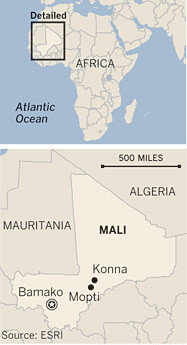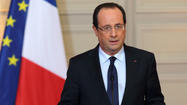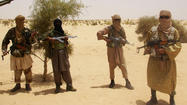redo Jump to...
print Print...
(by Bate Felix and Alexandria Sage, Chicago Tribune) BAMAKO, Mali and PARIS, France (Reuters) – Al Qaeda-linked Islamist rebels launched a counteroffensive in Mali on Monday after four days of French air strikes on their northern strongholds, seizing the central town of Diabaly and promising to drag France into a brutal Afghanistan-style war.
France, which has poured hundreds of troops into the capital Bamako in recent days, carried out more air strikes on Monday in the vast desert area seized last year by an Islamist alliance grouping al Qaeda’s north African wing: Al-Qaeda in the Islamic Maghreb (AQIM), alongside Mali’s home-grown MUJWA and Ansar Dine militant groups.
“France has opened the gates of hell for all the French,” said Oumar Ould Hamaha, a spokesman for MUJWA, which has imposed strict sharia, Islamic law, in its northern [stronghold] of Gao. “She has fallen into a trap which is much more dangerous than Iraq, Afghanistan or Somalia,” he told Europe 1 radio.
 Paris is determined to shatter Islamist domination of the north of its former colony, an area many fear could become a launchpad for terrorism attacks on the West and a base for coordination with al Qaeda in Yemen, Somalia and North Africa.
Paris is determined to shatter Islamist domination of the north of its former colony, an area many fear could become a launchpad for terrorism attacks on the West and a base for coordination with al Qaeda in Yemen, Somalia and North Africa.
The French defense ministry said it aimed to deploy 2,500 soldiers in the West African state to bolster the Malian army and work with a force of 3,300 West African troops from the immediate region foreseen in a U.N.-backed intervention plan.
The United States, which has operated a counter-terrorism training program in the region, said it was sharing information with French forces and considering providing logistics, surveillance and airlift capability. …
As French aircraft bombarded mobile columns of Islamist fighters, other fighters launched a counter-attack to the southwest of recent clashes, dislodging government forces from the town of Diabaly, just 220 miles northeast of Bamako. French and Malian troops attempting to retake the town were battling Islamists shouting ‘Allahu akbar,’ residents said.
The rebels infiltrated the town overnight from the porous border region with Mauritania, home to AQIM camps housing well-equipped and trained foreign fighters. A spokesman for Ansar Dine said its fighters took Diabaly, working with AQIM members.
Dozens of Islamist fighters died on Sunday when French rockets hit a fuel depot and a customs house being used as a headquarters. The U.N. said an estimated 30,000 people had fled the fighting, joining more than 200,000 already displaced.

France’s President Francois Hollande delivers a statement on the situation in Mali on Friday (1/11/13).
France, which has repeatedly said it has abandoned its role as the policeman of its former African colonies, convened a U.N. Security Council meeting for Monday to discuss the Mali crisis.
The European Union announced it would hold an extraordinary meeting of its foreign ministers in Brussels this week to discuss speeding up a EU training mission to help the Malian army and other direct support for the Bamako government.
French Foreign Minister Laurent Fabius said France would do everything to ensure that regional African troops were deployed quickly to follow up on the French military action, which was launched to block a push southwards by the Islamist rebels.
“We knew that there would be a counter-attack in the west because that is where the most determined, the most organized and fanatical elements are,” French Defense Minister Jean-Yves Le Drian told France’s BFM TV.
France has said its sudden intervention on Friday, responding to an urgent appeal from Mali’s president, stopped the Islamists from seizing the…capital of Bamako.
President Francois Hollande says Operation Serval – named after an African wildcat – is solely aimed at supporting the 15-nation West African bloc ECOWAS (Economic Community of West African States) which received U.N. backing in December for a military intervention to dislodge the rebels. …
Under pressure from Paris, regional states have said they hope to send in their forces this week. Military chiefs from ECOWAS nations will meet in Bamako on Tuesday but regional powerhouse Nigeria, which is due to lead the mission, has cautioned that training and deploying troops will take time.
……….
France’s intervention raises the threat for eight French hostages held by al Qaeda allies in the Sahara and for 30,000 French expatriates living in neighboring, mostly Muslim states.
Concerned about reprisals at home, France has tightened security at public buildings and on public transport.
However, top anti-terrorist judge, Marc Trevidic, played down the imminence of the risk, telling French media: “They’re not very organized right now … It could be a counter attack later on after the defeat on the ground. It’s often like that.”
Military analysts warn that if French action was not followed up by a robust deployment of ECOWAS forces, with logistical and financial support from NATO, then the whole U.N.-mandated Mali mission was unlikely to succeed.
“The French action was an ad-hoc measure. It’s going to be a mess for a while, it depends on how quickly everyone can come on board,” said Hussein Solomon, a professor at the University of the Free State, South Africa. He voiced grave doubts about the prospects of a properly equipped and trained ECOWAS force deploying effectively in a ground operation to follow up French air strikes. “It’s imperative that other NATO countries get involved,” he said. “Everybody talks about the threat of global terrorism, but then where is the global response?”
(Additional reporting by Emmanuel Jarry, Brian Love and Catherine Bremer in Paris, Justyna Pawlak and Adrian Croft in Busssels and Louis Charbonneau in New York; writing by Daniel Flynn; editing by Pascal Fletcher)
Copyright 2013 Reuters. Reprinted here for educational purposes only. May not be reproduced on other websites without permission from The Chicago Tribune. Visit the website at ChicagoTribune.com.
Questions
NOTE TO STUDENTS: This is a developing story. To fully understand where the terrorists came from, how they are funded, how they were able to take over half of a previously stable African country, etc., read more on your own. We have linked to several additional articles under “Resources” and provided some brief background below the questions.
1. Find the following information about Mali at the CIA World FactBook website or worldatlas.com:
a) capital
b) population
c) border countries
d) religious breakdown
e) type of government
f) location
2. The first paragraph of a news article should answer the questions who, what, where and when. List the who, what, where and when of this article. (NOTE: The remainder of a news article provides details on the why and/or how.)
3. Name the three Islamic terrorist groups that have taken over northern Mali.
4. Why is the French government so concerned with a terrorist takeover of Mali?
5. What role is the U.S. taking in Mali?
6. Why did France send troops into Mali to help the government fight the terrorists?
7. The reporters quote a professor from South Africa commenting: “The French action was an ad-hoc measure. It’s going to be a mess for a while, it depends on how quickly everyone can come on board,” saying he voiced grave doubts about the prospects of a properly equipped and trained ECOWAS force deploying effectively in a ground operation to follow up French air strikes. He is also quoted as saying: “It’s imperative that other NATO countries get involved. Everybody talks about the threat of global terrorism, but then where is the global response?” What do you think of the professor’s remarks?
Background
CNBC reports:
- Mali’s military has proved weak in tackling the rebel uprising. Units that had been trained by United States special forces almost immediately defected to the rebel side – a collapse that “astounded and embarrassed to American military commanders,” according to The New York Times.
- The newspaper reported that the United States has spent between $520 and $600 million in the past four years in an effort to prevent West Africa replacing Afghanistan and the Middle East as a new theater of conflict with Islamist terrorists.
Resources
More stories on Mali:
- from Los Angeles Times posted at Chicago Tribune:
chicagotribune.com/news/nationworld/la-fg-france-mali-fighting-20130113,0,7928804.story - report by Reuters:
chicagotribune.com/news/sns-rt-us-mali-crisis-eventsbre90d0qj-20130114,0,4838219,print.story - report by the Associated Press:
“Al Qaeda carves out own country in Mali, prepares to defend it”
washingtonpost.com/world/africa/al-qaida-carves-out-own-country-in-mali-prepares-to-defend-it/
Daily “Answers” emails are provided for Daily News Articles, Tuesday’s World Events and Friday’s News Quiz.




